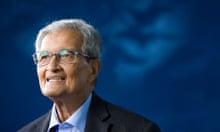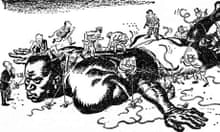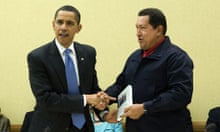One response to the development impasse caused by modernisation and dependency theories was "can do" neoliberalism; another involved reflection on the very purpose of development. This took shape across "alternative" approaches including environment, gender and sustainability. All these approaches grew up alongside the neoliberal right, but most were drowned out, for a time at least, by its noisiness.
Perhaps the most distinctive new approach, however – one set on meeting the new right's noisiness with a strategic and all-encompassing silence – was the post-development thinking embodied by the work of Colombian scholar Arturo Escobar.
Escobar's ideas are best summed up in his 1995 book Encountering Development, which offered much more than an analysis of mainstream development economics or the sprawling array of development actors and institutions it spawned. It was a critique of the whole rotten edifice of western ideas that supported development, which Escobar regarded as a contradiction in terms and a sham. For Escobar, development amounted to little more than the west's convenient "discovery" of poverty in the third world for the purposes of reasserting its moral and cultural superiority in supposedly post-colonial times.
Escobar felt development was, unavoidably, both an ideological export (something Walt Rostow would willingly have admitted) and a simultaneous act of cultural imperialism. With its highly technocratic language and forthright deployment of norms and value judgements, it was also a form of cultural imperialism that poor countries had little means of declining politely. "Perhaps no other idea has been so insidious, no other idea gone so unchallenged," Escobar sneered.
But what exactly did he mean? Surely some planning is better than outright anarchy? Surely, whatever one's political views, when confronted by a world as unequal as our own, it is important to try to do something?
As a glance at his intellectual influences suggests, Escobar's argument was a good deal more sophisticated than such questions allow. The first of these influences was the French philosopher Michel Foucault and his idea that power is not simply something that (rich, powerful) people hold over others, but is produced in and through all the things we do – even things like helping others. Through Foucault, Escobar came to the conclusion that development planning was not only a problem to the extent that it failed; it was a problem even when it succeeded, because it so strongly set the terms for how people in poor countries could live. Told how to behave, poor people were made subjects of development as much as they were subjects of their own government.
Escobar also sought to channel the insights of the Palestinian literary theorist Edward Said and his analysis of what he termed "Orientalism". Said had shown how western constructions of the Orient as exotic and enticing, yet also dangerous, were not merely passive descriptions of other people and places, they were central to the imaginative production of those places. And they were usually constructed either as sites of excess (sexuality, say) or conversely as lacking in some fundamental value (civilisation, say). In either case, those abnormalities needed bringing into line. Development was just a modern way of doing this: a re-enactment of Orientalist tropes in technocratic guise. Hence it was ultimately a way for the west to manage the rest for their own gain, only ever allowing poor people a future that the rich could imagine for them.
Coming at a time when western universities were in the grip of the postmodern challenge to systems of knowledge, Escobar's post-development critique sparked considerable debate. Coming at a time when mainstream development was beginning to incorporate a softer, more human approach alongside the market-driven solutions of the 1980s, Escobar found ever more evidence to support his ideas. As he saw it, the more the development industry claimed to be improving on past practice – as it tramped from anti-poverty to pro-poor to basic human needs approaches – the more it continued to fall into the serious trap of imposing a western agenda on others.
But if the first finger that people lift to help is on a hand destined to meddle, what are those who wish to see a fairer world to do? While some anti-development writers have encouraged a back-to-the-soil populism in response, Escobar's answer is again a good deal more sophisticated. For him the answer lies in creating space – intellectual first and foremost – for "local agency" to assert itself. In practice this means one of two things:
First, it means encouraging local communities and traditions rooted in local identities to address their own problems. Not buying into the western development agenda does not mean denying that some societies lack both resources and power relative to others. This was an argument that Escobar developed in dialogue with feminist scholars like Vandana Shiva, and it can be found today in such initiatives as the Buen Vivir moment in Latin America.
Second, and related to this first, it means criticising any existing distortions – economic or political – that limit peoples' ability to develop. Escobar has therefore been highly critical of free trade zones, such as the maquiladoras in Mexico, or what is happening on a vaster scale in parts of China. Instead, he points to a politics of "degrowth" as a way of addressing some of these distortions.
But can local always be the answer to the problems of globalisation? As many have argued, and as Escobar would doubtless acknowledge, when there are material differences in life chances (not to mention life expectancy) between different places, an excessive localism may end up as no less essentialising than an all-out universalism: little more than a romanticism of the poor.
But these are lessons that development has in large measure learned (which isn't to say it doesn't repeat many others). And if it has indeed failed to the extent that great poverty still exists, it has nonetheless helped bring about remarkable gains in life chances and opportunities. It has done this, moreover, despite as much as because of the unequalising effects of global capitalism.








Comments (…)
Sign in or create your Guardian account to join the discussion